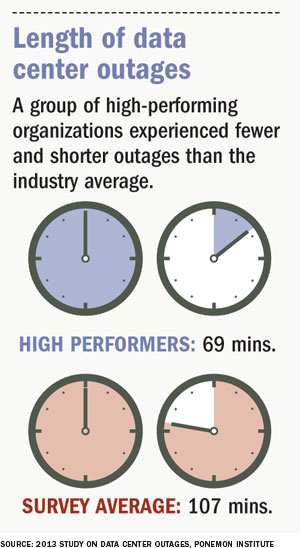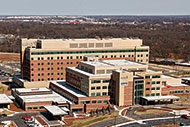 |
|---|
The frequency and duration of unplanned data center outages continue to pose a challenge for various types of health care facilities — problems made worse as the cost of outages soars over time and upper management support often is lacking.
A recent survey, sponsored by Emerson Network Power and conducted by the Ponemon Institute, reveals that health care facilities average 2.7 data center outages over a two-year period, the most compared with other markets surveyed, including communications, financial services, retail, education, public sector, hospitality and several others.
In addition, health care facilities have the second longest average data center outages at 122 minutes per incident, according to the report.
The good news is that the frequency of data center outages in the health care sector declined slightly from an average of three over a 24-month period determined in a similar study in 2010 by Emerson and Ponemon.
Even a slight reduction in the frequency of outages is significant because the average cost in lost revenue and repairs associated with each incident soared to $669,000, according to the 2013 report. That's compared to an average $397,000 cost per outage, a 74 percent increase over the 2010 survey results.
Dan Draper, manager of customer insights and research, Emerson Network Power, Columbus, Ohio, says health care is undergoing some growing pains with its data centers as more critical functions, such as electronic health records and digital imaging, require data center support.
"Health care data centers have grown from mostly basement operations to dedicated facilities the size of warehouses. Health care organizations never had to worry about data center best practices before because the only thing its computers were running was the email," Draper says.
As data center demands continue to increase, it will require that health care facility senior management put more of a priority on that department to reduce costly outages, he says.
The survey shows that of the 584 companies surveyed for the 2013 report, 41 percent say they have the full support of senior management to prevent and manage unplanned outages. That compares with only 30 percent of the health care facilities that say they have top-management support.
"Hospitals do a fantastic job of always being up and running and if they're not, there's a plan and procedure in place to keep them running," Draper says. "That same mentality and behavior needs to extend to the data center as well."
The encouraging aspect to fixing the problem is that even fundamental actions on the part of the facility management team can go a long way toward reducing the frequency and duration of outages, Draper says.
It's critical that UPS batteries are routinely tested and monitored to reduce outages, Draper adds. Another key is regular testing of generators and switchgear, another shortcoming for many types of health care facilities that is easily remedied.
Ensuring that the data center design matches a health care facility's needs and having sufficient staff that can quickly respond to problems are also critical elements of successful data center maintenance and operations, Draper says.
The slight reduction in the frequency of outages shows that health care is slowly demonstrating a higher level of commitment to data center maintenance and operation.
"Maintaining uptime is getting better for health care and that comes with experience. It is a baptism by fire. But, yes, things are getting better," he says.





